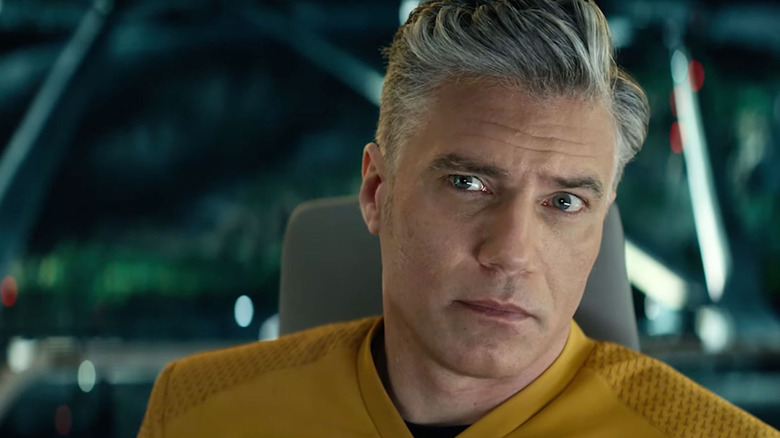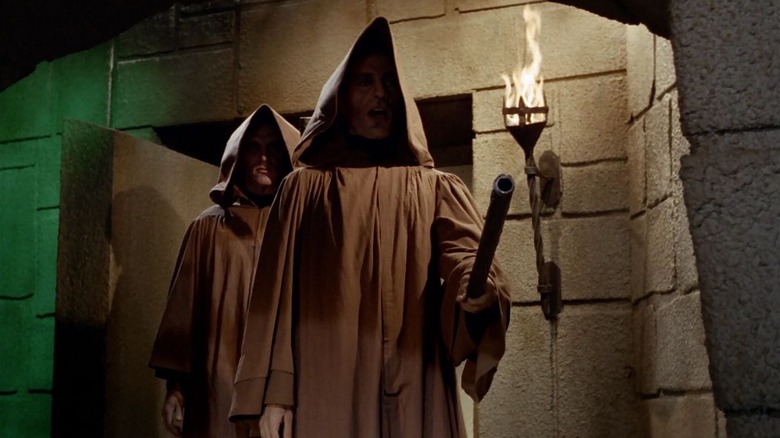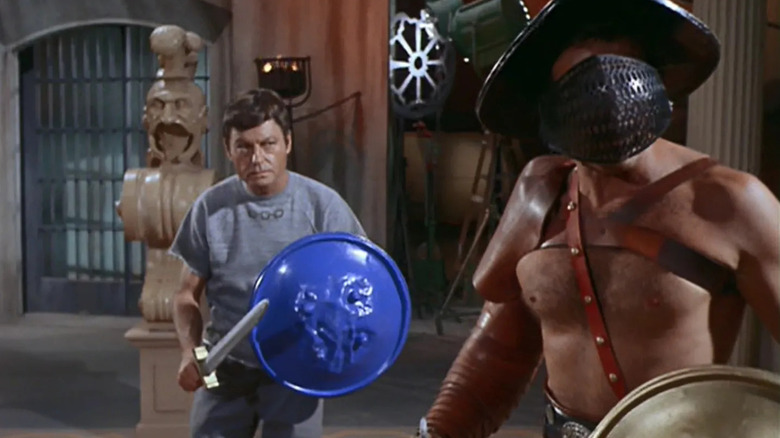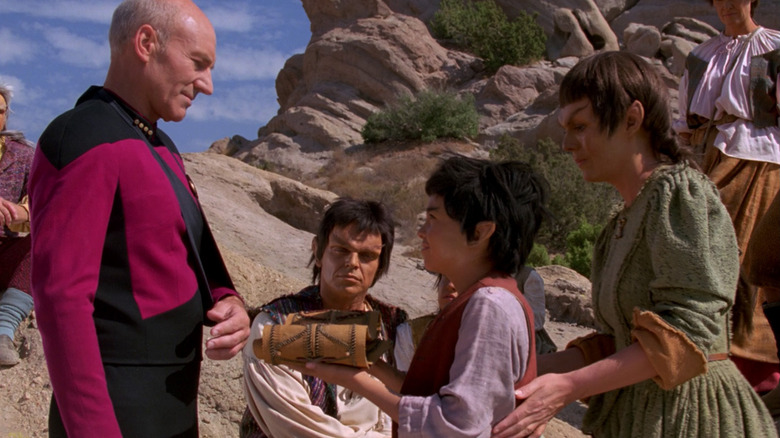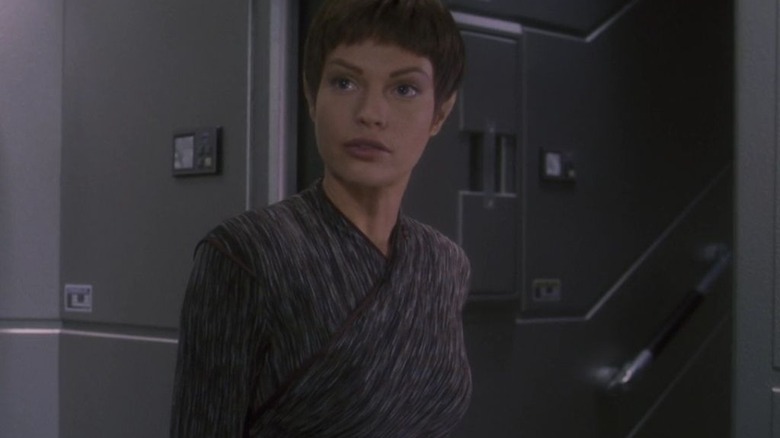General Order One: The Prime Directive In Star Trek: Strange New Worlds Explained
If we're going to talk about "Star Trek" and the Prime Directive, we need to talk about rats.
According to an article published by Columbia University, Norway rats were first introduced to the American continent in 1776 when Hessian soldiers — and the rats — arrived on ships to fight the American colonists. Rats, being hearty, quickly spread across the continent, thanks to their ability to reproduce quickly, their large size when compared to native rodentia, and their aggressive behavior. They also eat a lot, consuming two-thirds of their body weight in grain daily. The Norway rat has long been considered a destructive pest, and they still occupy large cities to this very day.
The Norway rat is hardly the most destructive thing to have spawned from Earth's annals of colonialism, and a brief look over your history textbooks reveals far too many examples of cultures infiltrating — and destroying — others. Every breath we take in the present contains particles of a horror from the distant — and not-so-distant — past. Usurpation, exploitation, and slavery are woven into our every garment. It is a legacy modern humanity must be in a constant state of unpacking.
When Gene Roddenberry created "Star Trek," he wanted it to take place in a post-colonialist world. In the future, humanity will have access to the greatest technology ever imagined, and will be able to soar from star to star, but they are not there to impose their values on others, and are certainly not there to conquer. There will be no war, interpersonal conflicts will be handled tactfully, and humanity will not interfere with the cultures of others.
That last bit is well-known throughout "Star Trek" as the Prime Directive, a much lauded and sometime-harangued principle that stands at the very center of the Federation's ethos. It's important enough to be called "The Prime Directive," after all, and it has come into play multiple times throughout "Star Trek" — sometimes under the name General Order One, a name change that is stated explicitly in the first episode of "Star Trek: Strange New Worlds" — as a constant ethical struggle.
Non-interference
The Prime Directive was first mentioned in the "Star Trek" episode "The Return of the Archons," which first aired on February 9, 1967. In that episode (written by Gene L. Coon), the Enterprise is investigating the disappearance of a ship called the U.S.S. Archon that had disappeared a century earlier. In so doing, Kirk (William Shatner) and crew beam down to the planet Beta III and encounter a planet of people dressed in early 20th-century garb, and who all seemed to be placidly hypnotized. When the clock strikes, "Red Hour" begins, and the people go wild, smashing windows, undressing, and rioting. Festival! Festival! The crew eventually finds that the people are under the thrall of an order-seeking computer named Landru that has been brainwashing people for centuries under the auspices of keeping them safe, arranging itself as a benevolent deity. When Kirk meets the computer — it's intelligent, but not emotional — the good captain argues that the computer itself is doing more harm than good, and it destroys itself.
Ethical quandary: Was Kirk right to end the computer's influence over the Betans? It was the place to which their culture had brought itself, after all. Landru, we learn, was a real person who lived 6,000 years previous, and who had become a Messiah figure after reducing a technologically busy planet to something simpler. Now Landru was an automated Savior machine.
The people on this planet were being robbed of their free will, but were also, unarguably, peaceful. The Prime Directive would dictate that the people be left alone. Kirk makes a (rather weak) argument that noninterference with a growing culture only applies if the culture is actively growing. The computer had stymied evolution, and Kirk felt justified in destroying it. He certainly felt a righteous need to impose his morals on this planet. As a way to make up for essentially toppling society, he orders a team of Federation educators come in and teach the Betans how to live in a functional society again.
This was followed up in a hilarious episode of "Star Trek: Lower Decks."
Bread and circuses
"Bread and Circuses" (written by Coon and Roddenberry, originally aired on March 15, 1968) is as ethically tricky as they come, but also features an instance wherein Kirk obeyed the Prime Directive. In the episode, the Enterprise encounters a planet that is very much like Ancient Rome, but evolved into a 20th-century-Earth-like timeframe. As such, there are still slaves forced into gladiatorial combat, but they are broadcast on modern TV equipment. Eventually Kirk and co. are going to be forced into the arena as slaves.
The Enterprise has encountered a world whereupon slavery still exists. With the ship's superior technology, Kirk could easily free the slaves, assassinate dictators, and install a democratic government with a team of Federation educators, right? Just like in "The Return of the Archons"? Doesn't this sound preferable to slavery? The issue with interfering in the case of "Bread and Circuses" is that it encourages colonialist thinking. If you feel you're in the right and you have superior technology to the "primitive" species you seek to aid, then congratulations, you are a colonialist.
"Bread and Circuses" leaves audiences on something of an ambiguous but generally optimistic note. Uhura (Nichelle Nichols) points out that the slave uprising they had briefly encountered called themselves The Children of the Sun. Only she had mistranslated the phrase earlier, and finds that the phrase was closer to ... The Son of God. Kirk opines that this planet had a Caesar analogue, but also a Christ analogue. The Enterprise did not end slavery on that planet, but knowing Earth history, one can take comfort in the fact that the Rome planet will continue to evolve. It will have new religions, new philosophies, perhaps Holy Wars, but — in the long run — may find itself eventually entering its own Roddenberrian future. They just need time to work all that s*** out.
Will people die and suffer? Yes. But the Prime Directive prevents humans from being the saviors. Civilization necessarily evolves at its own pace.
Who watches the watchers?
Quis custodiet ipsos custodes? One of the best examples of the Prime Directive at work in "Star Trek: The Next Generation" was in the episode "Who Watches the Watchers?," written by Hans Beimler, which first aired on October 16, 1989. In that episode, a disguised Federation outpost is watching over a primitive species — they are in their agrarian phase — suddenly becomes visible after an accident. One of the locals is injured in the accident and Dr. Crusher (Gates McFadden) beams him up to the ship in what is a clear violation of the Prime Directive. She justifies it by saying that they were the ones responsible for his injuries. The local (Ray Wise) witnesses everything on board the starship, including the work of Captain Picard (Patrick Stewart). Although Dr. Crusher tries to erase his memory, it doesn't take, and Wise ends up spreading a legend among his people of a new god called The Picard. Oops.
So that civilization is tainted. There's no going back. Picard, however, feels he can stem the damage somewhat by explaining to the locals that he is not a god, but a very mortal traveler. A regular person, just like them. Ray Wise, to prove that Picard is immortal, shoots him with an arrow. When Picard is nearly killed, the Wise character reneges. This primitive civilization now knows about the existence of aliens, but their culture will not be altered by a new belief system, a new religion, or a new worship structure. To most eyes, this was the preferable option.
The communicator
"Star Trek: Enterprise" took place before the inception of General Order One, and the crew of that show's ship had a heck of a time discovering why it might be needed. Captain Archer (Scott Bakula) is told by his Vulcan first officer T'Pol (Jolene Blalock) that Vulcans had a habit of noninterference, and it was they who invented General Order One, not yet adopted by human Starfleet.
In the episode "The Communicator" (written by André Bormanis, first aired on November 13, 2002), disguised Enterprise crewmembers — partly for study, but partly for fun — beam down to a 21st-century-tech-level planet to look around. Upon returning, they find they left behind a communicator, a technology far beyond what the planet currently possessed. The communicator was discovered by a local who thought Archer and his crew were an enemy faction invading their country. Eventually, after Archer returns to retrieve the communicator, the locals will apprehend him, remove his disguise makeup, and learn that his blood is red. Archer claims he's not an alien, but a genetic experiment conducted by his captor's enemies. Good story, bro. Events snowball to the point when shuttlecraft are flown in to rescue Archer.
The final scene of the episode is T'Pol grilling Archer over what he did wrong. Archer learns that he escalated a conflict on the planet's surface, and revealed tech they never knew possible.
Yeah. That's a 10 on the Whoops Scale. "The Communicator" is one of the better instances of why a philosophy of noninterference is required in a universe where multiple civilizations were evolving at different rates.
Roddenberry wanted that pact to be applied throughout history. At least in fiction, we can have it.
